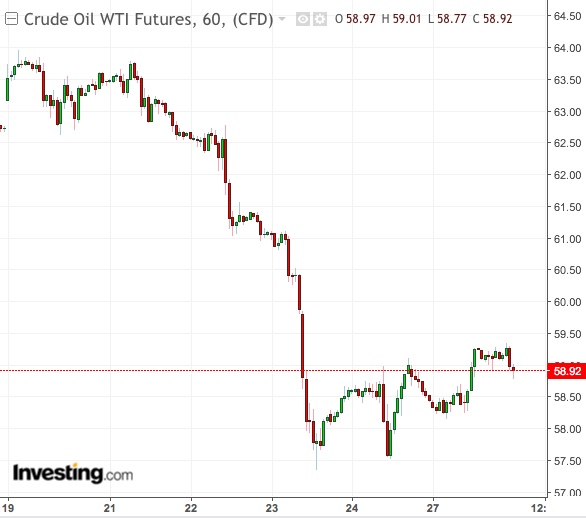What tidings will this summer bring for oil? With Memorial Day flagging off the annual U.S. driving spectacle, all eyes will be on gasoline stats from here on, to see if fuel consumption keeps up with the American Automobile Association's lofty expectations for the start of summer road travel.
The AAA says that despite pump prices of gasoline closing in on near $3 a gallon in some regions, U.S. citizens have hardly cut back on driving.
It forecasts that a record 37.6 million of them took to the road this Memorial Day, although the absolute number traveling by all modes of transport -- 43 million -- would only be the second highest since 2000.
Oil Bulls Looking For Rebound After Last Week’s Narrative
That's an interesting observation because weekly numbers from the U.S. Energy Information Administration tell a different story. Last week's data, particularly, was hardly inspiring, with the EIA reporting total gasoline inventories up by 3.7 million barrels during the week ended May 17, versus forecasts for a drop of nearly 816,000 barrels. And U.S. refinery runs have been surprisingly muted in the run-up to Memorial Day, staying at just under the key 90%-to-capacity mark. Doing longer-than-expected plant maintenance and processing less crude than anticipated week after week, refinery owners have become a new source of frustration to oil bulls already reeling from stubbornly highly U.S. crude production.

After oil’s worst week for 2019, those long the market will be hoping for a bullish overdose that could bring U.S. West Texas Intermediate crude back above the key $60 per barrel support and U.K. Brent back above $70. WTI lost nearly 7% last week and Brent 5%, after an unexpected 5 million-barrel build in U.S. crude stockpiles for a second week in a row.
Trade War The Bigger Problem; Morgan Stanley, StanChart Stay Bearish
A strong rebound for oil this week will be contingent on the market overcoming growing concerns about the U.S.-China trade war.
That might not be so easy. Beijing has indicated it'll never give in to U.S. demands to change its state-run economy, CNBC reported, saying U.S. complaints about the structural aspects of Chinese economy were regarded as unacceptable to the "core interests" of China.
At least two investment banks—Morgan Stanley and Standard Chartered—have less than optimistic outlooks on oil.
Analysts at Morgan Stanley said “deflationary forces are gathering momentum” in oil despite recent geopolitical tensions in the Gulf, amid Saudi allegations of Iranian sabotage of its oil infrastructure and a U.S. military buildup in anticipation of a Tehran attack.
Morgan Stanley attributes the deflationary momentum largely to the potential of shale to create another glut, despite its slower growth this year and the tendency of oil bulls to downplay U.S. crude's impact on the global market.
Said Morgan Stanley:
“With 200 [billion] barrels of resource with breakevens in the $40-45/bbl range, there is an increasingly credible scenario that shale could grow >1 mb/d per year out to 2025.”
Shale drillers were also squeezing the most out of the so-called fracking process, using the latest of digital technologies, which ensure maximum output for the lowest cost per barrel. The end result? A global impact on crude drilling costs and prices.
StanChart said its proprietary “bull-bear index” read, 100 this week, was “the weakest (such) data in the past six years”, as the EIA reported inventory growth in all categories except residual fuel oil, which resulted in a gross increase of 16.33 million barrels.
Hedge funds are bailing out of oil too, slowly pulling the hot speculative money that had been the bedrock of the year-to-date gain of nearly 30% in both WTI and Brent. “This is a very flows-driven market right now,” Scott Shelton, a broker at ICAP (LON:NXGN) in Durham, N.C., was quoted saying by the Wall Street Journal. After a series of supply outages and tension in the Middle East, oil failed to break higher, likely leading to a shift in sentiment, Shelton said, adding: “You just threw everything bullish you basically could at the market, and nothing happened.”
ConocoPhillips (NYSE:COP) CEO Ryan Lance appeared to have a similar view, saying:
“If we see $80, we kind of tell people: Be prepared, you might see $40 or $50 on the back end. Cycles are getting shorter, the peaks and troughs are getting significant.”
New British PM’s Brexit View To Lead Gold
Gold also enters a new phase of uncertainty on its role as safe-haven, after the U.S. dollar made a return last week as a preferred hedge against the U.S.-Sino trade war. The greenback’s supremacy to the pound has also made it a better alternative than gold for investors seeking a hedge to Brexit. This was particularly visible after British Prime Minister Theresa May announced her decision to resign on Friday, raising fresh questions about Britain’s divorce from the EU.
Gold's direction in the coming week would be decided by May's replacement, and whether the candidate will continue pushing for Brexit, which would further weaken the pound and boost the yellow metal.
Spot gold, reflective of trades in bullion, last traded at $1,284.87 per ounce, down 0.1% on the week.
Gold futures for June delivery, traded on the Comex division of the New York Mercantile Exchange, settled at $1,283.60 per ounce, up 0.1%.
The Dollar Index, which measures the greenback against a basket of six currencies, fell 0.3% to 97.44. The pound settled the week nearly flat at $1.2672.
Fawad Razaqzada, analyst at FOREX.com, said:
"If a pro-Brexit Tory leader is elected, such as Boris Johnson, then this could lead to further declines for sterling."
"But essentially it will be a wait-and-see situation in the very short-term outlook and the pound could see short-lived spikes here and there."
